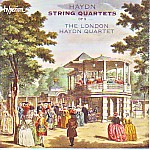It was exciting seeing this new recording of Haydn’s Op. 9, the works that the composer felt inaugurated his mature string quartet production, and that have been largely neglected on disc in favor of the Op. 20 set (which represent the first flowering of the fully mature classical style). The London Haydn Quartet specializes in this repertoire and so had a golden opportunity to establish its authority in music that has not been over-recorded to the point of silliness. Beginning the set with Quartet No. 4 in D minor, widely regarded as Haydn’s first masterpiece in the medium, offered them the chance to open by putting their best foot forward, while the use of period instruments should have energized music often smoothed over to the point of dullness.
Unfortunately, the result here is little short of disastrous. This has to be some of the ugliest quartet playing masquerading under the rubric of “authenticity” that you will ever hear. Those elaborate solo parts for Haydn’s celebrated concertmaster, Luigi Tomasini, such as we find in the Cantabile largo of No. 5, or the Adagio of No. 1, sound unforgivably thin and emotionally neutered in the hands of principal violin Catherine Manson. I suppose we have to resign ourselves to the current, historically false fad that calls for the near total avoidance of vibrato, but there’s no excuse for a basic timbre that sounds like a cross between a perpetual “sul ponticello” and, above the staff, harmonics. Not that the other players are any better; their parts are simply more tolerable because they are lower in pitch.
Hideous timbre is in any case the least of this group’s problems. Just listen to the opening movement of the D minor quartet. Yes, the tempo is marked moderato, but that does not mean “trudge”. Nor does it mean “play everything legato, with no rhythmic definition whatsoever”. Phrases trail off into nothingness, and Haydn’s expressive lines degenerate into an inarticulate mess. The opening movement of Quartet No. 12, at nearly 13 minutes, becomes all but interminable, particularly as the very close engineering captures not just every inexpressive, ugly sound, but plenty of sniffling and ambient noise as well. And all this supposedly from Haydn quartet specialists!
Happily you can get a fine set of Op. 9 on Brilliant Classics for about 10 dollars featuring the Buchberger Quartet, and if you want period instruments, the Festetics Quartet on Hungaroton makes these folks sound even more clueless than they do when taken in isolation. Please, Hyperion, don’t even dream of making this a series.
































